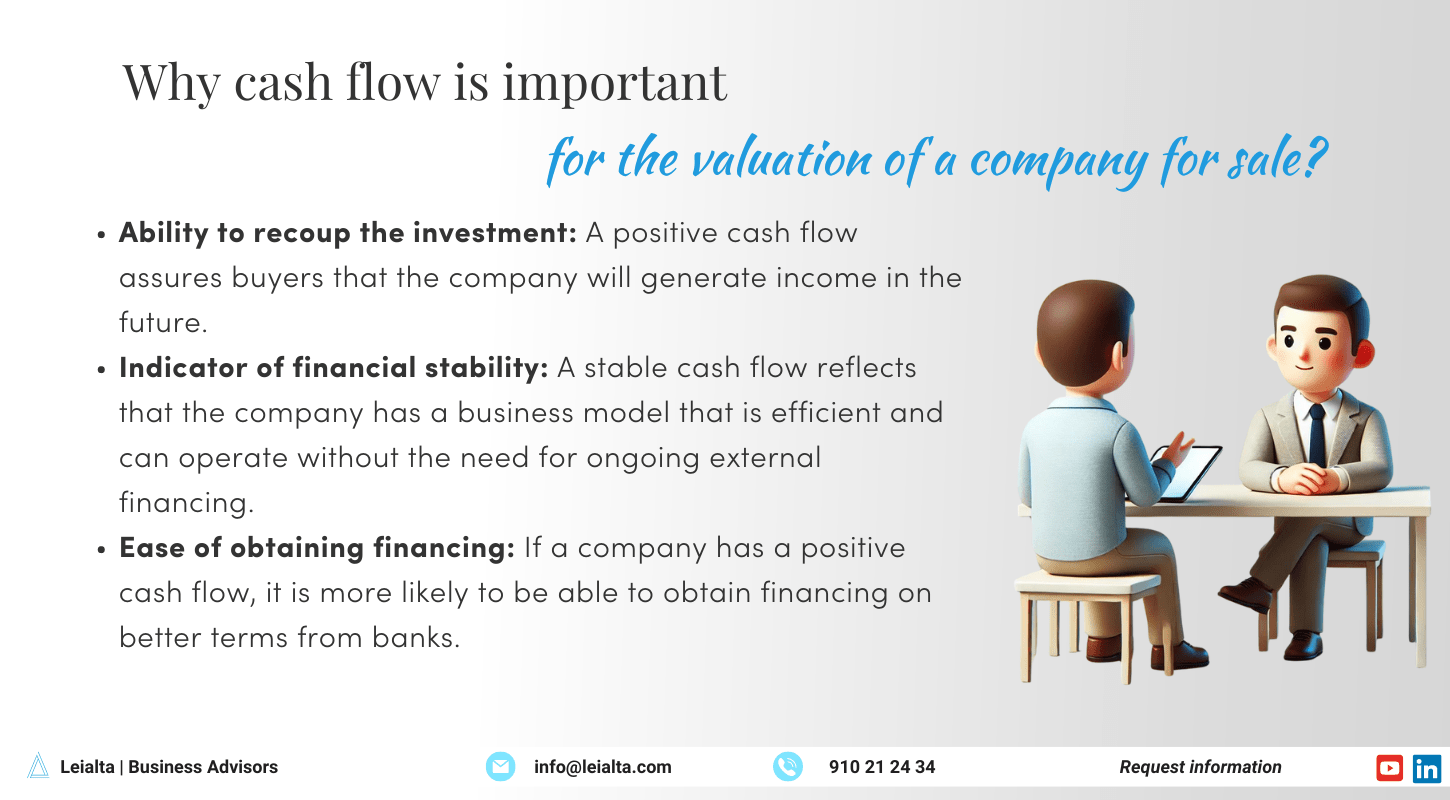
One of the most critical aspects of selling a company is determining its value. This is a complex process influenced by a number of factors. Cash flow is one of the aspects that affect the valuation. In this article we tell you what cash flow is and why it is important in the sale and purchase of companies.
What does cash flow mean in a business for sale?
Index of contents
Cash flow represents the amount of money flowing in and out of a business over a given period of time.
It includes both the income generated by the company’s operations and the cash outflows needed to cover operating and financial expenses.
In order to sell a company, it is essential that the cash flow is positive and stable to show the company’s ability to generate income for the future. Buyers or investors are looking for companies that will provide a good return on their investment.
Types of cash flow
There are three types of cash flow to consider when valuing a company:
Operating cash flow
This measures the income and expenses related to the company’s activities, such as the sale of goods and services. A positive operating cash flow indicates that the company generates enough revenue to cover its operating costs.
Investment cash flow
This refers to cash inflows and outflows to make investments in long-term assets. For example, this could be the purchase of equipment or the acquisition of real estate. The fact that the company is making these types of investments indicates that it has the potential for significant growth in the future.
Financing cash flow
This flow measures the cash inflows and outflows related to the financing of the company. It refers to loans, share issuance or dividend payments. A negative financing cash flow could indicate that the company is reducing its level of indebtedness.
Why is cash flow important for the valuation of a company for sale?
We have already highlighted that cash flow plays an important role when you want to sell a company, but why? Here are the reasons why it is a key factor:
- Possibility of recovering the investment. A positive cash flow assures buyers that the company will generate income in the future. This way they will know when they will recover their investment.
- Indicator of financial stability. A stable cash flow reflects that the company has a business model that is efficient and can operate without the need for continuous external financing. This provides investors with information that there is less financial risk.
- Ease of obtaining financing. If a company has a positive cash flow, it is more likely to be able to obtain financing on better terms from banks. Investors will see this as a positive.
What is discounted cash flow?
This method consists of projecting the future cash flows of the company and discounting them to their present value. This is done by using a discount rate that reflects the risk associated with these flows.
The most important thing in order to do the calculation correctly is to make reliable and realistic financial projections, based on correct data that reflect both the growth possibilities and the risks that may arise in the future.
Example of cash flow for a company for sale
To better understand how cash flow works in the valuation of a company, let’s start with a simple example:
The company SOCIEDAD S.L. generates 500,000 euros in annual revenue from the sale of financial advisory services. Its operating costs are 300,000 euros. This means that it has an operating cash flow of 200,000 euros. From this amount we have to subtract the investments necessary to maintain and grow the business, which are worth EUR 50,000. This means that the net cash flow is 150,000 euros.
For the sale of the company we can project this cash flow over the next 5 years and apply a cash flow discount of 10%, for example. That way we will know the net present value of the income that will occur in the future.
Ultimately, if you are considering buying or selling a company, cash flow is a key indicator to determine its true value and assess the long-term viability of the business. A detailed cash flow analysis not only provides insight into the company’s ability to generate revenue, but also provides a clear view of potential financial challenges and future growth opportunities. Investors are looking for businesses that can guarantee a secure and profitable return, so a solid and well-founded cash flow projection is essential for any successful transaction. Understanding these flows is the basis for an informed and strategic negotiation that maximises both the perceived value and market attractiveness of the company.
If you need an accurate valuation of your company, do not hesitate to contact our team of business sale and purchase experts, who will guide you through every step of the process to ensure a successful transaction in line with your objectives.




